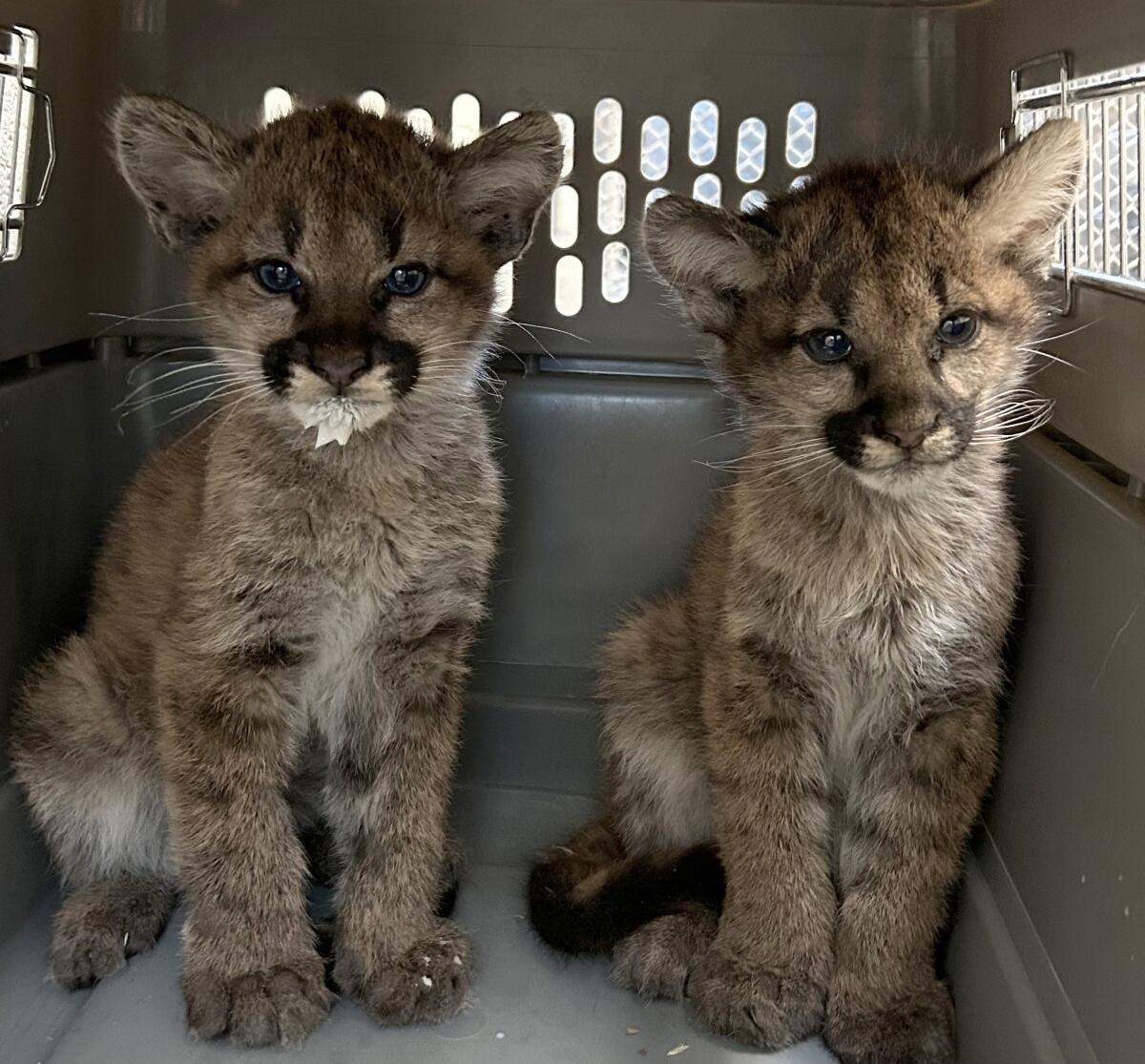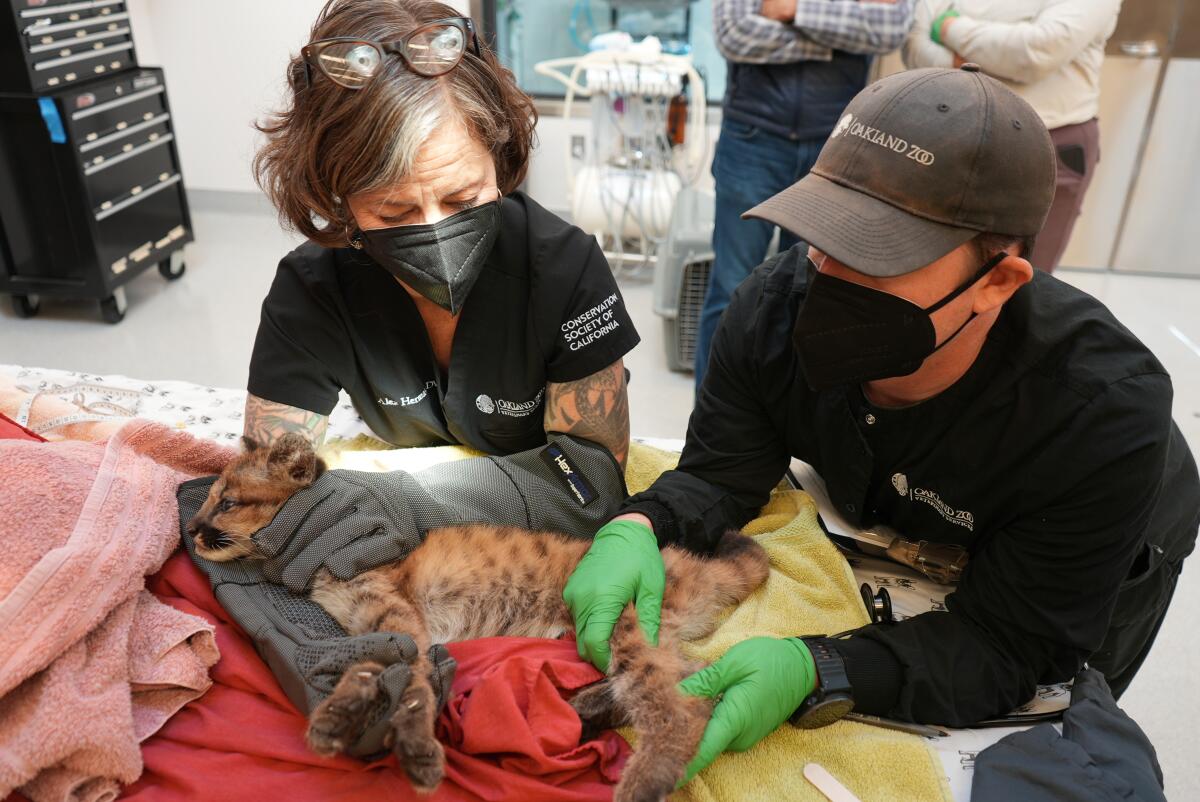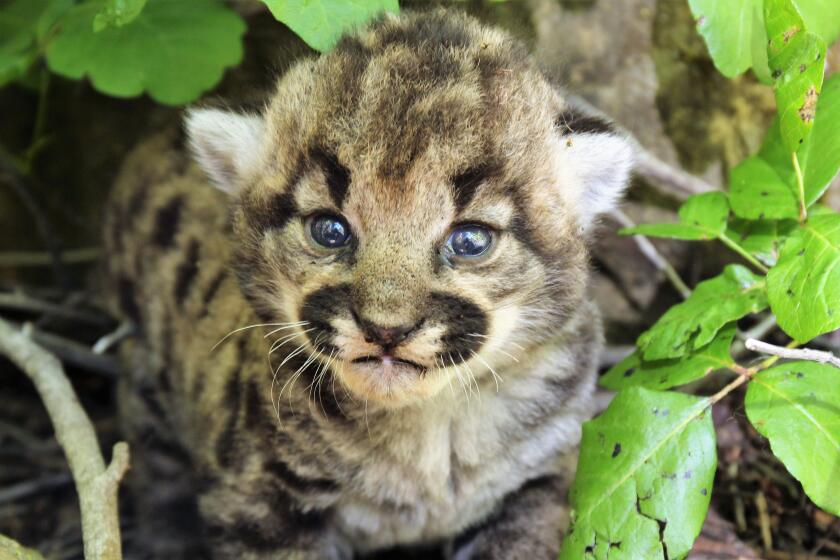Orphaned sister mountain lions find home in Oakland Zoo after mother is killed by a car

A pair of months-old mountain lion siblings who were orphaned about a week ago found a temporary home at the Oakland Zoo on Friday morning.
The female cubs, Maple and Willow, were discovered after wildlife officers found an adult female mountain lion hit and killed by a car along Interstate 280 in the Hillsborough/Burlingame area of Northern California on Thursday, Nov. 9.
“These cubs became orphans when their mother was struck by a car on a busy highway, a tragedy suffered by wildlife when safe passage across their natural territories isn’t possible,” said Nik Dehejia, Oakland Zoo’s chief executive.
Over the weekend, residents reported seeing two cubs alone in the area, with one resident spotting them safely in their backyard. Zoo officials said the cubs were without their mother for five days and had not eaten within that time.
Both cubs are now under the supervision of the Oakland Zoo’s Veterinary Hospital staff, which is conducting health examinations and providing triage. The doctors administered fluids to the visibly dehydrated and underweight cubs while awaiting the results of further bloodwork and testing, checking them daily.
“Right now, the girls are eating well. They are getting 24-hour care. They have one keeper whose sole purpose is kitten care,” said Erin Dogan, the Oakland Zoo spokesperson.

The cubs are approximately 6 to 10 weeks old, weighing just over 5 pounds. This rescue marks the 25th and 26th mountain lion recoveries for the Zoo’s Rescue and Recovery Program.
“Our team will be caring for the cubs daily to restore them to full health and for their overall animal well-being,” said Dr. Alex Herman, Oakland Zoo’s vice president of veterinary services.
Once cleared from the zoo’s intensive care unit, doctors will hold them until the California Department of Fish and Wildlife identifies a long-term home for the cubs, either another zoo or a sanctuary.
“What CDFW looks for —with some help from us— is a home that can provide every possible need they will have for the entirety of their life,” Dogan said.
The mountain lion dubbed P-77 gave birth to three female kittens that were found in the Simi Hills between the Santa Susana and Santa Monica mountains.
Tim Daley, public information officer for the wildlife department, says it’s not likely that cubs this young will be placed back into the wild.
Mountain lion cubs need at least two years with a mother to learn survival skills. Because the cubs are so young, they probably can’t return to the wild. “They’re going to miss out on two years’ worth of living with a mother learning how to hunt and survive, so releasing them into the wild just really isn’t an option,” Daley said.
Once the cubs are stable and nursed back to health, Daley said the goal is to transfer them as early as possible to a California zoo or sanctuary that gives the animals a chance to grow and thrive.
Maple and Willow’s permanent future home would need to be an enriching habitat where they can relax and express their natural behaviors.
There is a high probability that the sisters will live together but won’t be integrated with other lion cubs or groups. Daley said integration with other mountain lions doesn’t work well.
In the past, biologists tried “cross-fostering,” in which cubs are introduced into another den and with another mother. That hasn’t worked because mountain lions are very territorial and tend to travel alone.
The interactions between humans and mountain lions are a continued area of concern for the wildlife department, with the biggest risk to mountain lions being vehicles.
An estimated 6,000 mountain lions call California’s mountains and hillsides home, according to the department.
“There are certain parts of the state like the Los Angeles area where it’s a struggle,” Daley said. “Roughly half the state of California is considered mountain lion habitat.”
Start your day right
Sign up for Essential California for news, features and recommendations from the L.A. Times and beyond in your inbox six days a week.
You may occasionally receive promotional content from the Los Angeles Times.





